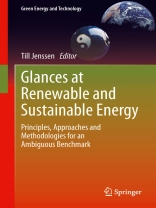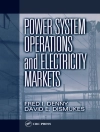Differing interpretations, perspectives and expectations on the term sustainability exist. To take sustainability as an action guiding mandate for implementation it needs to be concrete and measurable as well it should weigh pros and cons. But how can such an integrated measurement in the field of renewable energy be conducted balancing the trade-offs between opposing indicators?
Glances at Renewable and Sustainable Energy provides a thorough overview on the generic principles of sustainability assessment, including projective, thresholding and systemic principles and summarizes five common approaches for a holistic measurement. Approaches such as multi criteria decision analysis, ecological footprint analysis and normative-functional concepts are applied to different case studies in developed-, emerging and developing countries to cover a wide bandwidth of various renewable energy carriers under various conditions. Each case study includes 2 boxes illustrating the scheme behind the approach and exemplary calculations to allow a systematic comparison and a critical reflection of the methods applied.
Compiling results on renewable energy assessment of the last decades, Glances at Renewable and Sustainable Energy gives researchers, students, consultants, politicians and entrepreneurs the tools to advance their oriental and instructional knowledge on sustainability and sustainability measurement, to reflect their decisions and tools for analysis and to transfer this knowledge into problem-solving.
Tabella dei contenuti
1.Choosing sustainability?.- 2.Renewable Energy: Resources and Technologies.- 3.Multi-criteria decision analysis of renewable heating supply technologies in Germany.- 4.Ecological footprint: the example of Gauteng region.- 5.Social Costs of on-shore wind energy in Europe.- 6.Guard rails for bioenergy in developed and developing countries.- 7.The normative-functional concept of sustainability and the question of indicator weights.- 8.A Kaleidoscope of Renewable and Sustainable Energy.
Circa l’autore
Dr. Till Jenssen (born 1980 in Bochum, Germany) graduated in spatial planning (2005) and earned his Ph.D on bioenergy in 2009. He was consultant in regional analysis at BFR (Office for Regional Analysis, 2004-2006) as well as researcher (2006-2012) and head of the section Settlement and Energy (2009-2012) at the Institute of Energy Economics and the Rational Use of Energy (IER), University of Stuttgart. Since 2012 he works for the Ministry of the Environment, Climate Protection and the Energy Sector in Baden-Württemberg.












